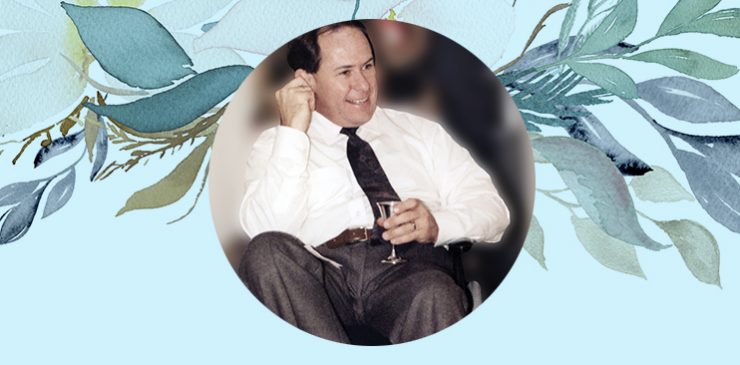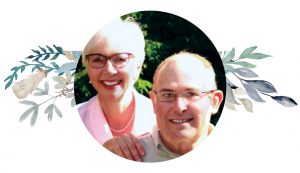During the 80s and 90s, Mary Ann was the Director of Research at the Lyndhurst Rehab Centre and Kirby served as the Executive Director of the Ontario Division of the Canadian Paraplegic Association (SCIO’s former name); both served on our Board for several years. Sadly, Kirby passed away in 2017. Today, Mary Ann is a Professor in the School of Rehabilitation Therapy and in the Department of Public Health Sciences at Queen’s University and serves as Academic Lead for the Canadian Disability Policy Alliance which is a national collaboration of academic, community and policy partners dedicated to enhancing disability policy in Canada. Mary Ann and Kirby committed to making a very significant gift to SCIO to create a legacy which will fund spinal cord injury research. Here, Mary Ann shares with us what led her and Kirby to make this personal and generous decision.
I’m an occupational therapist by background so I had worked with people with spinal cord injuries and strokes in physical rehab at a couple of places, but homecare was the place where spinal cord injuries got my attention because people were coming home from rehab and I was going to see them in their homes as their OT, trying to figure out how they were going to manage, what were they going to do with their time, how were they going to adapt their house, how were they going to drive – all of the things that they address in rehab, but the rubber really hits the road when you get home.
I was very moved by the challenges and the possibility that people armed with the right kind of information could make a difference. I was acutely aware that you go into the homes of 10 people coming out of rehab and starting a new life. A proportion of them seem to meet the challenge with some degree of success, and for another proportion, it seems that nothing goes their way. I was keen to try to understand, and help occupational therapists understand, what the difference is and how to triage those people who most needed intervention and for whom someone who cared and seemed to have the answers might be the most use. That was how I got interested in coping and social support. Some of those resources come from inside – those are the coping things. And some of them come from other people and those are the social support things, and how do those two work together to create the most positive atmosphere for someone to thrive.
I consider it a huge asset to have started my research career at Lyndhurst next door to CPA (SCIO) in that I learned to be accountable to consumers in my research. I think I gained an understanding of the fact that – and it sounds stupid to have to say this – but there are people at the end of all of this research and we are not doing it for ourselves. We are doing it to try to create opportunities, enhance equity, learn things that make peoples’ lives better. I can’t tell you the number of times that I was challenged with the “so what?” question when I was working at Lyndhurst, and at the time it was kind of threatening and destabilizing, but I am so grateful for it because I learned to ask myself that question. And now I ask my graduate students and my colleagues that question. That accountability to the people you are doing the work for, is not always built into academic research and I think it is so important.
We agreed that the work of SCIO was something we were both devoted to. Ensuring that efforts continue to make the world a better place for people with spinal cord injuries through our relationship with SCIO seemed like the best way to make sure that it continues to happen.
– Dr. Mary Ann McColl
One of the wonderful things about working with people with spinal cord injuries is that there is a huge degree of alignment and affiliation with the research, so if you ask 100 people to participate in your research, 90 of them are going to say yes, and that is great gift, but with it comes a responsibility. I found it enormously gratifying to have a portion of my research career in spinal cord injury for just that reason – that people want to engage with the research, want to participate, want to have a say, want to drive the agenda.
For us, we didn’t have any kids, so we don’t have anyone anticipating an inheritance from us and we said, “What are we gonna do?”. We agreed that the work of SCIO was something we were both devoted to. Ensuring that efforts continue to make the world a better place for people with spinal cord injuries through our relationship with SCIO seemed like the best way to make sure that it continues to happen. We also wanted to have some sort of a meaningful memorial, and we both felt a strong commitment to research – the endowment is for spinal cord injury research.
My experience as a researcher is that, if you can provide stable funding for one dedicated person who has a pretty good chance of being successful, you can leverage a lot of activity. You can leverage other external funding. You can attract other scholars. You can give trainees opportunities. So that person dedicated to spinal cord injury research can generate a lot of other activity. Rather than funding 17 different people with small grants, I believe in the model of providing a stable base of funding for one person and letting them be the engine for all the activity. It depends on choosing that one person. We trust that the organization will create a process to identify the right person. I think at a certain point as a donor, you have to hand over the money and trust the people administering it to do a good job. We trust that SCIO will administer it responsibly, and that is why we chose SCIO.
Giving in this way is not for everybody. But, if someone is looking for a way to make a difference in perpetuity, long after we are gone, to leave behind something that matters beyond your own family, then I think it is a way to make a meaningful contribution – as the commercial used to say, the gift that keeps on giving – even after you are gone. That was our desire.







